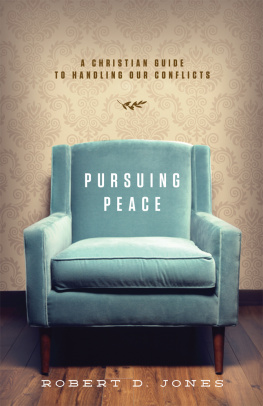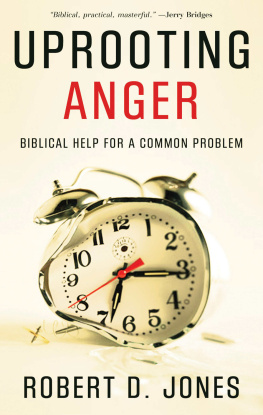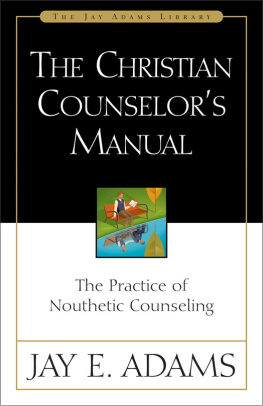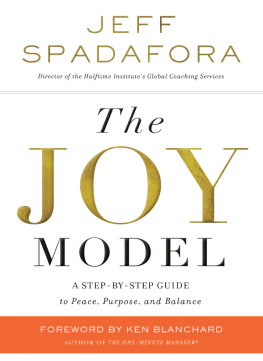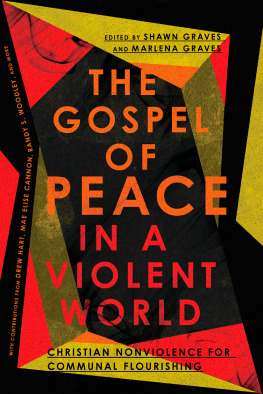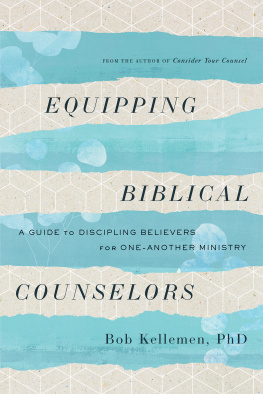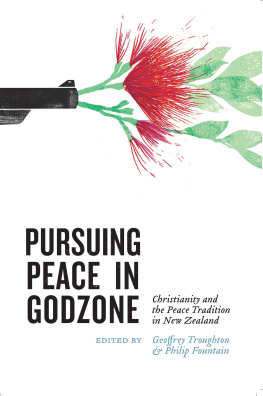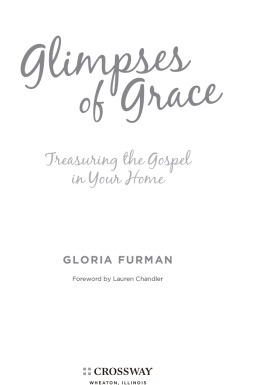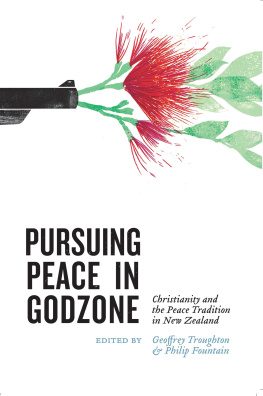Contents
Pursuing Peace: A Christian Guide to Handling Our Conflicts
Copyright 2012 by Robert D. Jones
Published by Crossway
1300 Crescent Street
Wheaton, Illinois 60187
All rights reserved. No part of this publication may be reproduced, stored in a retrieval system, or transmitted in any form by any means, electronic, mechanical, photocopy, recording, or otherwise, without the prior permission of the publisher, except as provided for by USA copyright law.
Cover design and image: Josh Dennis
Interior design and typesetting: Lakeside Design Plus
First printing 2012
Printed in the United States of America
Unless otherwise indicated, Scripture quotations are taken from the Holy Bible, New International Version . Copyright 1973, 1978, 1984 Biblica. Used by permission of Zondervan. All rights reserved. The NIV and New International Version trademarks are registered in the United States Patent and Trademark Office by Biblica. Use of either trademark requires the permission of Biblica.
Scripture quotations marked ESV are from the ESV Bible ( The Holy Bible, English Standard Version ), copyright 2001 by Crossway. Used by permission. All rights reserved.
Scripture quotations marked NASB are from The New American Standard Bible . Copyright The Lockman Foundation 1960, 1962, 1963, 1968, 1971, 1972, 1973, 1975, 1977, 1995. Used by permission.
All emphases in Scripture quotations have been added by the author.
| Trade paperback ISBN: | 978-1-4335-3013-5 |
| ePub ISBN: | 978-1-4335-3016-6 |
| PDF ISBN: | 978-1-4335-3014-2 |
| Mobipocket ISBN: | 978-1-4335-3015-9 |
Library of Congress Cataloging-in-Publication Data
Jones, Robert D., 1959
Pursuing peace : a Christian guide to handling our conflicts / Robert D.
Jones.
p. cm.
Includes bibliographical references and index.
ISBN 978-1-4335-3013-5 (tp)
1. Conflict managementReligious aspectsChristianity.
2. Interpersonal relationsReligious aspectsChristianity.
3. ReconciliationReligious aspectsChristianity. 4. ForgivenessReligious aspectsChristianity. 5. PeaceReligious aspectsChristianity. I. Title.
BV4597.53.C58J66 2012
248.8'6dc23 2012009968
Crossway is a publishing ministry of Good News Publishers.
VP 24 23 22 21 20 19 18 17 16 15 14 13 12
14 13 12 11 10 9 8 7 6 5 4 3 2 1
Why am I passionate about pursuing relational peace ? Because relationships wither without it .
In 2004 my wife Lauren and I and our two sons moved to Raleigh, North Carolina, where I teach at nearby Southeastern Baptist Theological Seminary in Wake Forest. Having lived in apartments and then a church parsonage for nineteen years, we bought our first house. After looking at twenty-three options in two days, we settled on our top choice: roomy for our family foursome, modestly priced, and nestled in a traffic-free cul-de-sac. And to top it all off, it was situated on my ideal-sized property, a whopping .19 acres (yes, the decimal point is accurate; I figured I could handle mowing that size lawn, or paying a teen, when my sons moved out).
What we didnt bank on was the condition of that little lawn. It was a weedy mess, a field not of dreams but of orchard-grass clumps. One of my sons tells of a 2:00 a.m. return home only to discover, as his car approached the house, that our little yard was a late-night hot spot for local deer. (Weve contemplated posting a Weed Buffet sign and charging our dear deer friends a $9.95 all-you-can-eat fee.)
What did we do? We added a truckload of topsoil, seeded it, and then did the various things that the experts recommended at the proper intervalsfertilizing, spreading lime, aerating, reseeding, and so forth. But the reseeding, we were warned, had to be preceded by another vital step. To sow grass seed on top of the weeds would yield little grass; we had to weed out the orchard grass.
Relational conflict is like that orchard grass. We long to grow relationships marked by trust and joy and goodwill and honesty, but as we pursue these we find patches of unreconciled conflict underneath. Few maladies plague our lives more than relational conflict. Whether in our homes, our workplaces, our schools, or even our churches, tensions continue and disputes quickly sprout. Conflicts happen in every relationship: husband and wife, parent and child, brother and sister, supervisor and employee, church member and church memberthe list goes on. As a young counseling student I once asked a doctoral mentor whether I was unusual for having more conflicts with my wife than with other people. He assured me that my experience was quite common. Conflicts can mark, and mar, many of our relationships, even the dearest ones.
So what should we do? Your decision to pick up this book tells me three things about you. First, you are experiencing conflict in your life (or someone you care about is). Second, you are honest enough to admit it. Third, you are humble enough, or desperate enough, to seek help.
This book has two simple goals: to provide you with a step-by-step process for pursuing peace in all your relationships and to give you a tool you can use to help others. I wish to provide a clear path down which you and your friends and family members can walk with confidence and hope. Its a biblical path, one that relies on the absolute authority, sufficiency, and life-giving power of Gods Spirit-breathed Word. Its a Christ-centered path, one that depends on the forgiving and empowering grace of Jesus our Redeemer and one that imitates the life of Jesus our example. Its a practical path, one that provides concrete action steps, case examples, and suggested language to handle specific situations. And its a proven path, one that God has enabled me to follow in my life (albeit imperfectly), and one down which I have had the privilege of leading many hundreds of individuals, couples, churches, and Christians schools for nearly thirty years as a pastor, professor, certified biblical counselor, and certified Christian conciliator and church-conflict interventionist and trainer.
My own interest in biblical peacemaking began in the mid-1980s when I graduated from Trinity Evangelical Divinity School and, at twenty-six, became the pastor of a small church in Hurricane, West Virginia. The church had suffered a severe split, and the congregation I joined was the bleeding remnant. The aftershocks of that conflict were real, and I knew little about handling them. In time I became increasingly hungry to know how to better shepherd my people, so I began attending the annual biblical counseling training week provided each June by the Christian Counseling and Educational Foundation (CCEF) in a northern suburb of Philadelphia. As my wife and church family would attest, that training changed my life and ministry radically.
The guest plenary speaker one summer was Ken Sande, president of Peacemaker Ministries, who presented an early version of his Peacemaker seminar materials. As a young pastor I was attracted to both Kens wise, biblical content and his winsome, gracious manner. His teaching that week sparked a special interest that God has fanned for over two decades now. Along with my ongoing training in biblical counseling through CCEF, the National Association of Nouthetic Counselors, and Westminster Theological Seminary (DMin), I began to attend the annual conferences of Peacemaker Ministries. I soon entered their conciliator training program and was invited to serve on their church intervention teams. I continue to serve adjunctively with Peacemaker Ministries in various roles.

